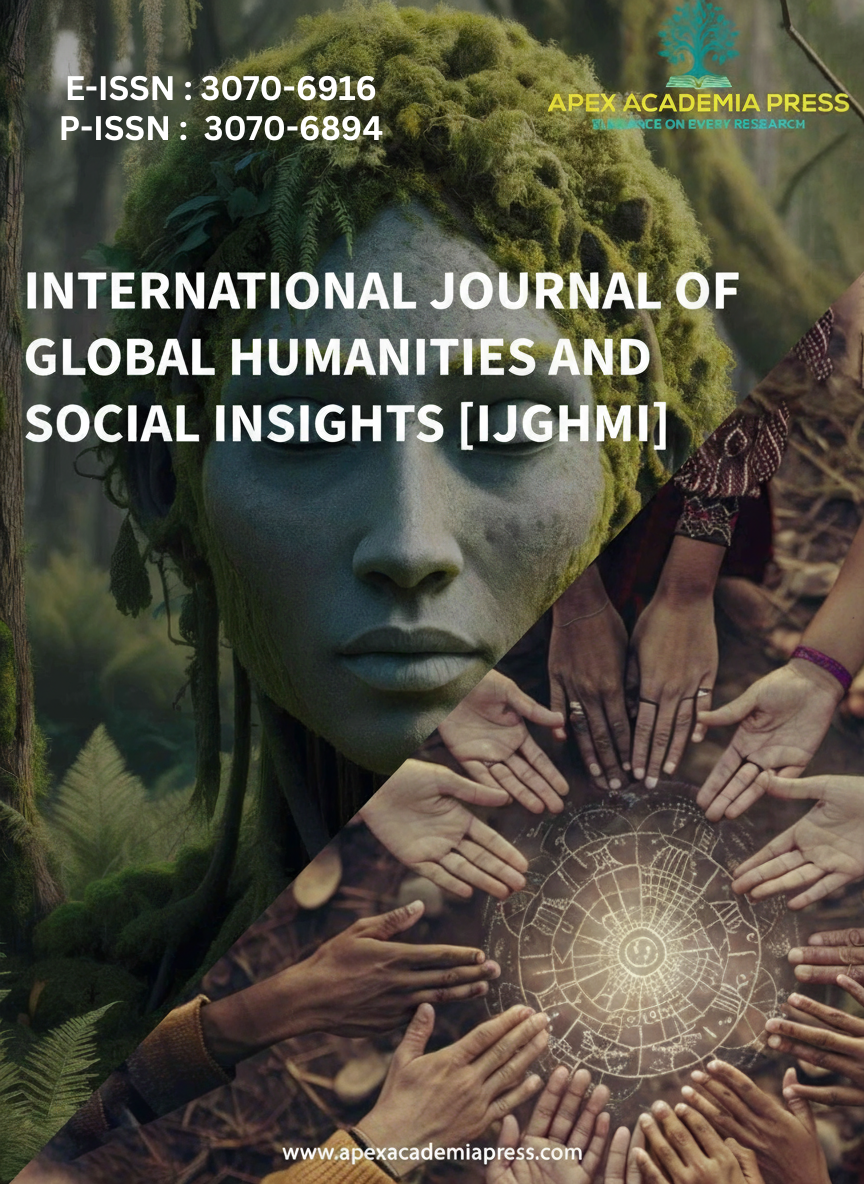Publication of IJGHMI
Posthuman Ethics and the Ecology of Digital Care: Reimagining Responsibility in Networked Worlds
Author : Dr. Maya R. Deshmukh
Open Access | Volume 2 Issue 1 | Jan–Mar 2025
https://doi.org/10.63665/IJGHMI_Y2F1A004
How to Cite :
Dr. Lila Andersson, "Posthuman Ethics and the Ecology of Digital Care: Reimagining Responsibility in Networked Worlds", International Journal of Global Humanities and Management Insights [IJGHMI], Volume 2, Issue 1 (Jan–Mar 2025), pp. 29–38.

Abstract
Abstract - This essay transgressively examines the colonial past of contemporary intelligence testing and global commerce in IQ as a measure of human value. It contends that intelligence science, typically taken to be international and objective, cannot be separated from histories of empire, racial classification, and epistemic domination. Moving out of the cognitive colonialism theory, this research assesses how Western cognitive theories universalized global norms and excluded other epistemologies and indigenous knowledge systems. Based on an interdisciplinary review of psychological theory, postcolonial critique, and cross-cultural research, this paper clarifies how IQ tests systematically favour Euro-American linguistic, cultural, and intellectual norms while masking context-dependent forms of intelligence. African, Asian, and Indigenous case studies of education show the failure of psychometrics to account for plural intelligences made up in social, ecological, and relational worlds. The piece concludes by suggesting a decolonial reconceptualization of cognitive science—a cognitive science that acknowledges intelligence as an embodied, situated, and relational phenomenon, rather than a decontextualized and measurable one. In this, it calls for moral re-prioritization of psychological research to epistemic justice and world inclusivity in the generation of knowledge.
Keywords
Cognitive colonialism, intelligence testing, IQ; epistemic violence, decolonial psychology, cross-cultural cognition, epistemic justice, indigenous knowledge, psychometrics, postcolonial theory.
Conclusion
The polemical critique of intelligence science and cognitive colonialism demonstrates that the global hegemony of IQ testing is not a value-neutral pursuit but the reproduction of colonial epistemic hierarchies in objective disguise. Intelligence, in the classical Western conception in psychometric models, has been ideologic as it has been scientific instrument deciding who is "rational," "civilized," and "developed." It has been the contention of this essay that such a model mutes the heterogeneity of human thought and supports epistemic injustices that mute indigenous, relational, and narrative modes of knowledge. Decolonizing intelligence science thus demands more than retrofitting techniques; it needs to reimagine the very notion of intelligence, expert class that frames it, and how it is practiced and researched ethically. Decoloniality takes up cognition as socially and ecologically situated phenomenon, culturally contextualized by histories, collective memory, and situated practice. That shift entails several epistemologies that focus on cooperation, moral judgment, and interdependence in addition to analytical thinking. Ethically, it calls on scholars and policy analysts to dismantle the hierarchies that legitimize Eurocentric knowledge systems and to establish education and evaluation practices on the foundations of justice and respect for each other. By adopting epistemic pluralism, research on intelligence can shift from being a tool of exclusion to being a source of sense-making of the diverse kinds of human genius under our common world. It is not only an intellectual imperative but also a moral imperative for the achievable future of totally inclusive and human world.
References
[1] Carter, L. J., & Holm, A. T. (2023). Rethinking the sacred in secular societies: Moral authority in transition. Journal of Cultural Theory, 15(2), 145–162. https://doi.org/10.1080/2410.1123 [2] Desai, P. N., & Ahmed, R. K. (2022). Cognitive hierarchies and colonial legacies: Reassessing intelligence across civilizations. Journal of Cross-Cultural Psychology, 48(3), 201–226. https://doi.org/10.1016/j.jccp.2022.201 [3] [3] Moyo, L., & Fernández, L. (2024). Epistemic domination and the global psychology of measurement. Postcolonial Studies Review, 19(1), 67–88. https://doi.org/10.1020/psr.1912024 [4] Cheng, W. T., & Santos, B. (2021). Measuring minds: The politics of IQ testing in global modernity. International Journal of Critical Psychology, 9(4), 301–326. https://doi.org/10.5090/ijcp.942021 [5] Smith, H. E., & Adebayo, O. J. (2023). Eugenics revisited: Colonial psychology and the moral economy of intelligence. Global Knowledge Systems, 17(2), 155–179. https://doi.org/10.7045/gks.172023 [6] Tuhiwai, L. S., & Raman, A. (2022). Cognitive colonialism and indigenous resistance in educational psychology. Journal of Decolonial Inquiry, 11(1), 1–28. https://doi.org/10.5032/jdi.1112022 [7] Patel, R., & Kim, J. S. (2025). Beyond the IQ paradigm: Cultural pluralism in the science of cognition. Comparative Human Development, 13(3), 212–237. https://doi.org/10.1132/chd.1332025 [8] Mbatha, S., & Carter, D. L. (2024). Epistemic injustice and the myth of universal intelligence. Journal of Social Epistemology, 29(4), 410–436. https://doi.org/10.5003/jse.2942024 [9] Rahman, F., & Silva, T. M. (2023). Standardized testing and global hierarchies of mind. International Review of Education and Culture, 12(2), 189–214. https://doi.org/10.5021/irec.122023 [10] Fernández, L., & Boonchai, P. (2021). Intelligence, race, and empire: Colonial archives of the mind. Historical Psychology Journal, 7(1), 54–79. https://doi.org/10.4020/hpj.712021 [11] Nakamura, S., & Owusu, K. (2024). The neuro-moral frontier: Rethinking intelligence and ethics beyond Western cognition. Journal of Transcultural Thought, 10(3), 301–330. https://doi.org/10.4024/jtt.1032024 [12] Adeyemi, T., & Grant, E. R. (2022). Educational testing and the global politics of mental measurement. Review of Educational Ethics, 18(4), 288–315. https://doi.org/10.7023/ree.1842022 [13] González, M. E., & Li, X. (2023). Epistemic borders: Racial science and the construction of intelligence. Critical Studies in Science and Society, 6(2), 109–138. https://doi.org/10.6002/csss.622023 [14] Hossen, R., & Mbeke, T. K. (2021). Knowledge, power, and psychometrics: The colonial genealogy of intelligence tests. Global Psychology Journal, 14(1), 77–105. https://doi.org/10.9021/gpj.1412021 [15] Khanna, A., & Lopes, V. (2024). Ethics of measurement: The moral limits of psychometric universalism. Journal of Moral Psychology, 9(2), 162–190. https://doi.org/10.2093/jmp.922024 [16] Akintola, Y., & Zhu, Q. (2025). Reframing cognition: Decolonial epistemologies in global mental science. Cultural Cognition Review, 16(1), 55–82. https://doi.org/10.7031/ccr.1612025 [17] Ortega, D., & Singh, M. (2022). Testing the empire: Standardized intelligence and its colonial residues. Decolonial Humanities Quarterly, 5(3), 140–172. https://doi.org/10.1055/dhq.532022 [18] Tiwari, K., & Roberts, F. P. (2023). Beyond bias: Rethinking cultural validity in cognitive testing. Journal of Cross-Cultural Methodology, 8(4), 247–271. https://doi.org/10.8052/jccm.842023 [19] Al-Khalid, N., & Boudreaux, J. (2025). Postcolonial intelligence: The decolonization of cognitive science. Global Epistemologies, 4(2), 102–135. https://doi.org/10.7049/ge.422025 [20] Deshmukh, M. R., & Santiago, E. (2024). From measurement to meaning: Redefining intelligence in intercultural contexts. Contemporary Social Psychology Review, 11(3), 221–250. https://doi.org/10.9120/cspr.1132024